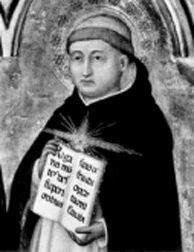‘The Dumb Ox’ bellows
 The favoured philosopher of the Catholic Church was St. Thomas
Aquinas (c.1225-1274) for he reconciled Aristotle’s philosophy with
Christianity. He was born in Sicily and educated at the University of
Naples. Aquinas was canonised by Pope John XII in 1323. The favoured philosopher of the Catholic Church was St. Thomas
Aquinas (c.1225-1274) for he reconciled Aristotle’s philosophy with
Christianity. He was born in Sicily and educated at the University of
Naples. Aquinas was canonised by Pope John XII in 1323.
While clarifying Aristotle’s philosophy, Aquinas made many original
contributions. He is well known for introducing five ways to prove the
existence of God through logical argument. He said that the existence of
God can be proved by considering the concept of change. According to him
there was something which was the cause of change. The cause itself was
not subject to change. The cause that did not change was God. In his own
words, “If the hand does not move the stick, the stick will not move
anything else.”
Secondly, Aquinas said that causes always operated in series, but
there had to be a first cause. The first cause that did not change was
nothing but God. The argument was similar to his first proposition and
philosophers down the ages have criticised it for being confused.
Thirdly, Aquinas said everything in the world would come to an end.
But there would have been a time that nothing existed in the world. As
something could not come from nothing, it must have always existed. The
thing that always existed was God.
Quality
Fourthly, Aquinas said some things exhibited varying degrees of
quality. For such a thing to appear, there would have been something
that was perfect. That could only be God.
Finally, Aquinas said everything had a purpose. but to have a purpose
there would have been some superior force that directed the purpose. The
director was once again God.
|

St. Thomas Aquinas: Of all the pursuits open to men, the
search for wisdom is more perfect, more sublime, more
profitable and more full of joy. |
Aquinas’s cosmological and ontological arguments were accepted by the
Catholic Church. However, modern philosophers have completely rejected
them.
Aquinas had a chequered history. At the age of five, he was enrolled
in the Benedictine Abbey School at Montecassino. The Benedictines were
Roman Catholic monks known for their modest lifestyle combined with
physical labour and spirituality. Under their care young Aquinas
acquired religious and academic skills.
Turning point
A turning point in his life came when he was sent to the Imperial
University of Naples where he was influenced by Dominican monks who were
dedicated preachers. Unlike the Benedictine monks, they took vows of
poverty, chastity and obedience. While the Benedictines put up their
monasteries in the country, the Dominicans established themselves in the
towns. By the mid-13th century the Benedictine monasteries were
declining and the Dominicans were gaining popularity.
Aquinas decided to embrace the Dominican way of life, but his family
objected to his decision. His mother and elder brothers forced him to
give up his Dominican views. He was kept in a room and a provocatively
dressed girl was sent to him one night. However, Aquinas kept on praying
until the girl decided to leave the room. While in confinement, he wrote
a treatise On Fallacies. Finally, his family members allowed him to
remain a Dominican.
Fortune
Aquinas had the fortune of learning at the feet of Albertus Magnus
(Albert the Great) at Cologne. Albert realised the need to ground
Christian faith in philosophy and science. Aquinas, however, went a step
beyond his teacher by constructing a coherent philosophy of his own.
When Aquinas first arrived in Paris, he was nicknamed “The Dumb Ox”
because of his rural manners, farm-boy physique, and slow ways. Even his
handwriting was so horrible that nobody could read it. But Aquinas did
his studies well. One day his teacher was stunned by his brilliance and
said, “We call this man the Dumb Ox, but some day his bellow will be
heard throughout the whole world.”
|

